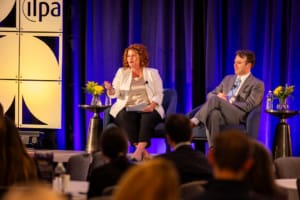ILPA CEO Jennifer Choi and the SEC’s William Birdthistle

ILPA CEO Jennifer Choi and the SEC’s William Birdthistle
ILPA hosted its fifth annual Legal Conference, two days of practical, technical and networking sessions oriented toward LP legal community attendees.
“I look forward to this event because of you—the community, ILPA members—the terrific enthusiasm you bring, and the great depth of discussion we’ll have over these next two days,” said ILPA CEO Jennifer Choi at the event opening.
The event, which is planned with support and direction from ILPA members on its Legal Advisory Council (LAC), covered topics from fund terms, to AI in legal, to continuation funds and the current ESG landscape. The LAC is chaired by Adam Lippiett of Siemens.
Much attention was devoted to the SEC’s sweeping Private Fund Advisers Rule, a key area of engagement for ILPA since early 2022. In addition to a session solely devoted to the topic, Choi sat down with the SEC’s Director of the Securities and Exchange Commission’s Division of Investment Management William Birdthistle for a fireside chat, where he shared about his experience joining the agency and his division’s approach to engaging with industry, including ILPA, on PFA and other rulemakings that impact the private markets.
Attendees also had ample time to connect with fellow professionals, ILPA staff and service providers through LP-only roundtables, networking breaks and receptions.
Interested in what you missed? Find a few highlights from each session below. LCON attendees can navigate to the Attendee Hub to view replays of select sessions.
Additionally, for attendees seeking CLE credit, access the CLE booklet here and email ILPA staff here if you require a certificate of completion.

Members of the LAC in attendance
Session Highlights
The Impact of the SEC’s Sweeping Reforms on Private Markets
- Need a crash course on the PFA Rule? Review the ILPA resources here, including a recent webcast on the topic.
- Panelists said there is a clear need to double down on points in the new PFA rulemaking that could be interpreted by GPs in their favor with the SEC. ILPA plans to work on providing members with more clarity on the outcome of these rules.
- The loose, easily interpreted language that is consistent in the new PFA rule is a challenge that needs to be addressed presently, though that is difficult given the package is tied up in litigation.
- GPs may say they cannot carry out aspects of the rule, such as reporting quarterly statements, pointing to conflicts with previous SEC rulings, such as the marketing rule or preferential treatment rule.
- While fiduciary duty language was removed from the final rule, panelists stressed that should not stop LPs from pushing back on egregious terms.
Market Trends in Fund Terms
- Despite the hope that a changing market environment would translate to more LP-friendly negotiations, terms have remained largely unchanged.
- LPs have had the most success negotiating for LPAC seats and fee and expense disclosures, while GPs have been unwavering on demands around fiduciary duty.
- Larger funds are giving out discounts to LPs more frequently than smaller funds, but according to panelists, larger funds are generally making up the difference and more through management fees.
Shaping the Future of Side Letters
- LPs are not necessarily pushing for new terms in this environment, but rather doubling down on terms they’ve regularly pushed for in the past.
- There is still uncertainty among LPs about how the SEC’s new PFA Rule will change the way side letters are utilized and negotiated, as they are still trying to fully understand the rulemaking and the timeline for its implementation, again, a task compounded by it being tied up in litigation.
Get Back the LPA Terms You’ve Lost
- Compared to where private equity first started, terms that regularly favor GPs in LPAs have become widespread.
- LPs are challenged by increasing fees and reporting requests. Management fees have remained the same percent, but as funds have grown exponentially, GPs continue to receive a big pay raise.
- Over the past 10 years many LP wins, such as 100% fee offsets, have been steadily eroded by GPs. Panelists stressed the importance of learning lessons from the past 10 years and staying vigilant on terms.
- Panelists advised LPs to remember, that as true negotiators, they have the power to walk away from a deal.
Leverage and Finance
- While sub lines were generally used during low interest rate environments as a way to smooth out capital calls, there is still appetite among GPs to use these loans as interest rates continue to rise.
- According to a panelist in the lending space, NAV loans seemed to be talked about more than they are used, essentially being leveraged by organizations in secondaries. They are also generally a bit more expensive than sub-lines, with NAV loans being 100-150 basis points higher.
- During diligence, panelists encouraged LPs to ask questions around what GPs are planning to use the loan for, what value the loan will add to the investment, how it will affect the value to both LPs and GPs, how much they’ve been used in the past and how managers have been dialoguing with other LPs about their use.
AI in Legal
- Artificial Intelligence (AI) can not only search for information, but interpret, summarize and explain complex problems in seconds. The technology is available to help LPs be more efficient, and save time and money.
- Panelists recommended that LPs familiarize themselves with the technology by experimenting with free generative AI platforms, like ChatGPT, and request demos and ask questions from other service providers and experts in the field.
- AI has a wide range of capabilities but is still being developed today. It is important to have a human review critical information generated by AI before incorporating it into day-to-day operations.
Roundtable: ESG in the Crosshairs
- LPs have differing approaches to ESG – some do not consider it at all, while for others, it’s a fundamental consideration.
- Agreement across attendees, which has been echoed across the broader community, is that it’s not in anyone’s interest for GPs to have a large number of differing ESG reporting requests from their LPs – to find more success in reporting requests, search to find common ground and convergence with your GPs.
- Attendees stressed the importance of intentionality around what metrics are requested and why; don’t rush into ESG reporting without considering what information is important to one’s organization.
Pushing Back on the Status Quo: Continuation Funds
- LPs with limited resources often still have issues pushing back on continuation fund terms in LPAs – their time is focused on terms that will affect them throughout the life of a fund, rather than defining the framework for a transaction that may never happen.
- Timing continues to be an issue for LPs. They are consistently asked to make quick decisions on whether they will “roll or sell,” often with inadequate time to fully understand the conflicts, terms and rationale of the transactions.
- During the Q&A portion of the session, panelists were not convinced that the preferential treatment piece of the PFA rules would have an effect on the continuation fund process.
- Looking for more on continuation funds? Get ILPA’s guidance here.
Save the date for next years’ LCON. LCON is back at the Ritz-Carlton Pentagon City October 1-2, 2024! Registration will launch in the spring.
Contributors: Isabelle Burgess, Brian Hoehn, Benjamin Holt, Kassidy Jeansonne